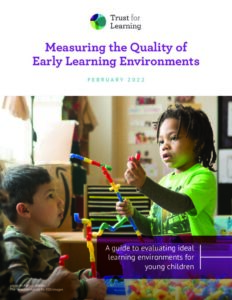Measuring the Quality of Early Learning Environments
Trust for Learning
This publication from Trust for Learning shares expert insights to support holistic, equity-driven approaches to measuring program quality. Guided by a workgroup of early childhood measurement experts, this two-part guide brings fresh perspectives and new ideas for leaders to consider when evaluating programs that serve young children and families.
Central to the report is the belief that an early childhood program cannot be considered high-quality without equity of access, experience, and opportunity, resulting in equitable outcomes for all children and families. The guide recommends the use of quality measures to reflect the full range of experiences that children need to thrive, as well as the supports required to provide those experiences, such as public systems, professional development approaches, teacher pay, and other factors. The guide is framed by the principles of ideal learning environments for young children, a set of nine essentials drawn from child development research, and high-quality pedagogical approaches.
